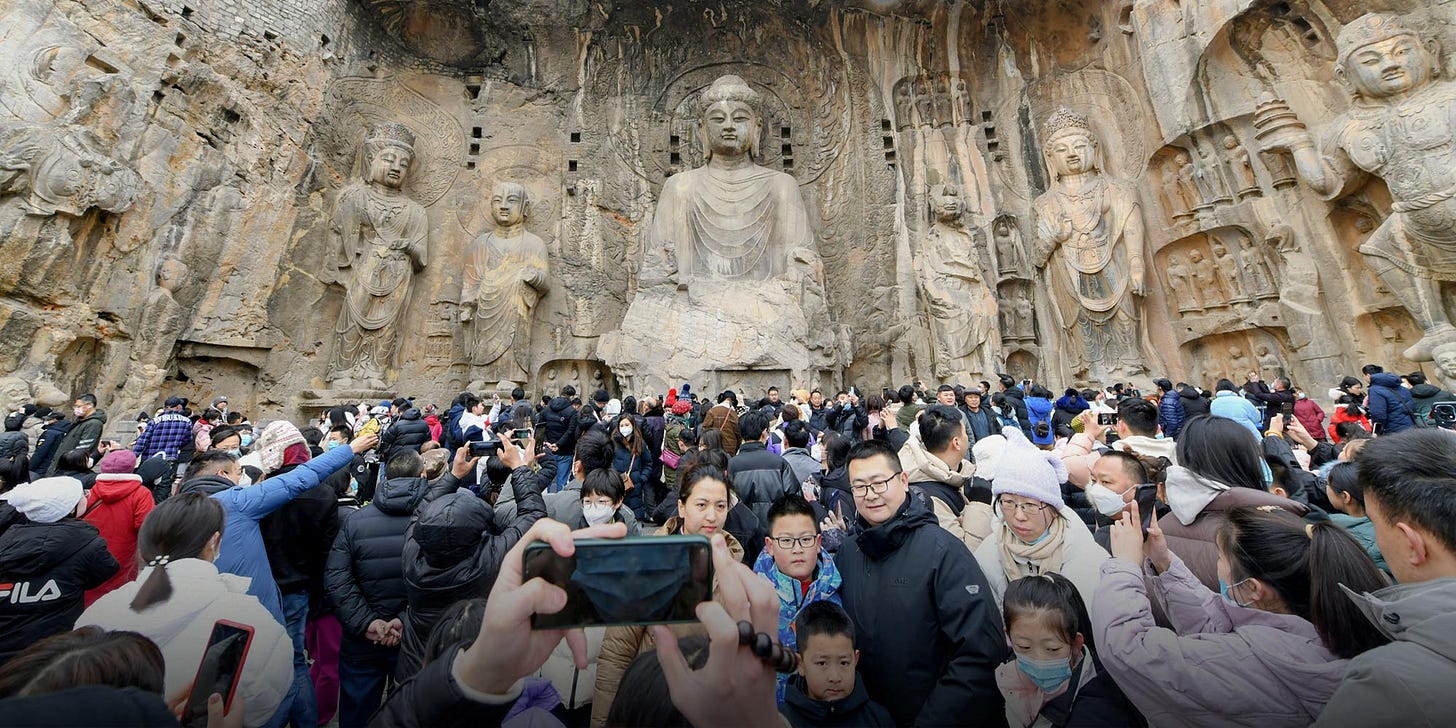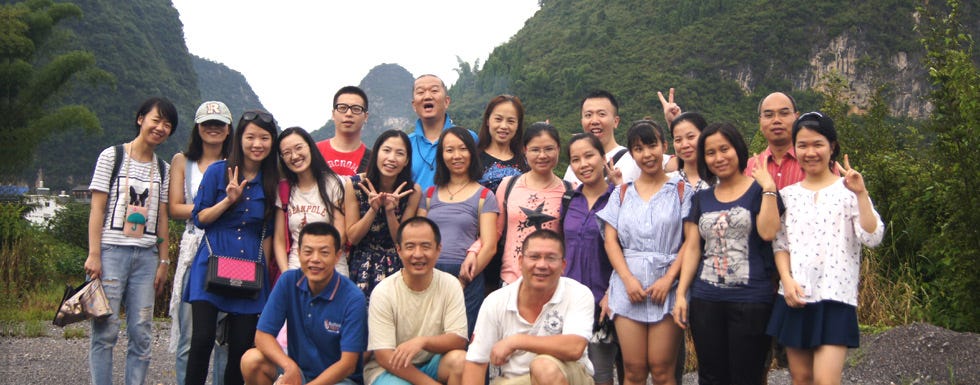What makes China's "special-forces-style" travelers special?
Tourism has gradually become a rigid demand for the young Chinese nowadays, as they are proud of and keen to learn the country's landscapes and history.
Zhang Nan, a young man from China's Chengdu city, has made himself an online celebrity by posting his record of topping "Wu Yue," five famous Chinese mountains located in five separate provinces, within five days, and his refined schedules and fast-paced travels made him a typical young Chinese in love with low-budget and physically challenging travel.
A new fad among young Chinese, such trips were made mostly by college students or workplace newcomers who have taken pride in completing their seemingly impossible travel plans and fancied themselves as special forces.
They normally set out on Friday nights or holiday eves and manage to get back on the morning of the next workday to catch their courses or work, after rushing to dozens of spots during their weekend tours.
These hectic travelers usually post their itinerary routes online, share the scenes of excitement, fatigue, missed sceneries as well as the time spent with friends. The ones that are likely to attract most attention online are those who have traveled the longest possible distance and visited the most possible scenic spots within the least time and the least possible spending.
Their travel style elicited mixed comments from the media and the public. Reporter Casey Hall of Reuters labeled them as "anti-spending special forces" and "a symptom of the underlying weakness in household consumption." Zhang Han with the Global Times, an English newspaper under the People's Daily, discovered "a sense of urgency" in the travelers, particularly junior and senior year students whose college life was largely sealed off on campus or restrained at home due to COVID-19.
As these young Chinese are keen on arranging busy schedules to make up travel plans that were postponed, some skeptics belittle the style as "a completely cursory tour without learning anything."
Peking Ensight advocates a discussion of the phenomenon from multiple perspectives, especially overlooked ones.
A RIGID DEMAND OF SEEING THE WORLD
Tourism has gradually become a rigid demand for the young Chinese nowadays, as they are proud of and keen to learn the country's landscapes and history.
Such travelers not only enjoy the beautiful sceneries along their journey, but also gain psychological satisfaction and cultural experiences as well.
Experts say the "special forces tourism" is likely to become a trend, and more attention should be paid to this kind of personalized tourism pattern and people's ever detailed demands.
Industry insiders also spotted business opportunities in the "special forces" style travel boom, with some suggesting that tourist destinations and relevant enterprises could focus more on the need of the young people to develop more novel services.
"Young people such as college students have their own travel choices, and their eagerness to see the world deserves respect. The 'special forces tourism' reflects their courage in exploring the outside world," said Ma Shihan, a researcher with Zhejiang University.
The huge potential of China's tourism market is a strong support for the thriving of different tourism patterns.
According to the country's culture and tourism ministry, Chinese people made 274 million domestic trips during its May Day holiday which started on April 29, a 70.83 percent increase from last year's holiday period.
The tourism revenue also reached over 148 billion yuan, and that was 128.9 percent higher from last year, according to the ministry.
THRIFT CULTURE REMAINS
Despite the time and budget limits, these travelers were determined to go out and to spend. Such behavior is nowhere near the so-called "anti-spending" manner of tourism.
On the contrary, the "special-forces-style" tourism is in itself a kind of "pro-spending" approach under the traditional Chinese thrift culture, where one tends to live within one's means.
On that basis, these travelers acted boldly enough in making plans and attempts, no matter how challenging the tasks were to their physical conditions.
Emotionally, no one felt like being poor in the process. Instead, such travelers tried to do as many things as they could during the journey and found pleasure in it. Between the toil of traveling, there were also emotional gains and self-recognition.
Not only that, it is also arbitrary to label the "special forces" travelers "anti-spending" when the phrase is primarily referred to the opposition to excessive governmental spending. If the travelers do want to be against spending, why bother taking a trip or trips when simply staying at home is apparently the cheaper choice?
On the contrary, it should be deemed a comforting sign that there are fortunately still a group of young people who are embracing this frugal consumption culture of making both ends meet, when today's consumers seem to have long accepted the philosophy of living on credit.
ENABLING INFRASTRUCTURE FACILITIES
One thing often overlooked by observers is that China's sophisticated transport network and high-standard infrastructure are an enabler of such "special rushes."
Zhang has accomplished what his parents could have never imagined at his age, as the country's transportation network has seen sea changes in the past two decades.
Back in 2000, a train trip would have taken twice the time needed today, while the expressway network was also less sophisticated. Even in the past five years alone, China's total length of high-speed railways in operation expanded from 25,000 km to 42,000 km, while the length of expressways increased from 136,000 km to 177,000 km.
Another factor that helps make "special forces tourism" happen is the unprecedented life convenience brought by powerful internet applications. Young people nowadays can get abundant travel information instantly on smartphones and other devices, which empowers them to precisely manage their schedule and be able to make timely adjustments during the journey.
With the support of the country's massive huge transportation network and a flourishing digital life, young Chinese have a greater chance now than ever to accomplish an adventurous journey on time.
JOYS AND SORROWS
Special forces is a strenuous labor to some extent. But such trips bring more joys to the travelers, with many thinking it is all worth it.
Hasty it may seem, the "special forces" style is applauded by some as a "youthful impulse," which is more about being with someone or just doing something together. It has not much to do with "learning," or being of worldly "meanings."
Some would just grab his or her bag and hop on a train to see a person missed so much or not seen for so long. It doesn't have to be a big meal or a luxury gift there. It is the person you hug or kiss that matters.
After all, it is a journey that restores you as you go, a journey that is not all about material things. The moments also shine when you were being happy, sad, or even happy-sad along the way.
These travel experiences not only serve as a boost to the spirit, but also leave something to cherish.
"The best thing it leaves to me is probably a sense of calmness in doing things, after going to so many places and doing so many things in only two days," said a netizen who have participated in "special forces" tours.
TO BE CONTINUED
The three years of COVID impacts have marred the country's tourism industry but at the same time generated huge pent-up demand, which has created waves of "revenge consumption," a way people choose to spend more time or money than usual to make up for their lost joy.
More stories of the "special-forces-style" travel will likely be unfolded, as the Dragon Boat Festival holiday, starting June 22, and the summer vacation are drawing near.
In the eyes of Wu Liyun, director of the Research Center for New Businesses in Tourism at Beijing International Studies University, this new trend is only the consumption behavior of a specific group at a specific stage where both income and time are limited.
This phenomenon could be ephemeral, but it may also evolve into a collective memory of a generation.
Some critics say the young travelers were a bit self-righteous as their physical and mental powers are utterly no comparison to the real special forces troopers. But so what? Young and bold -- that's what makes youth tempting and adorable.










